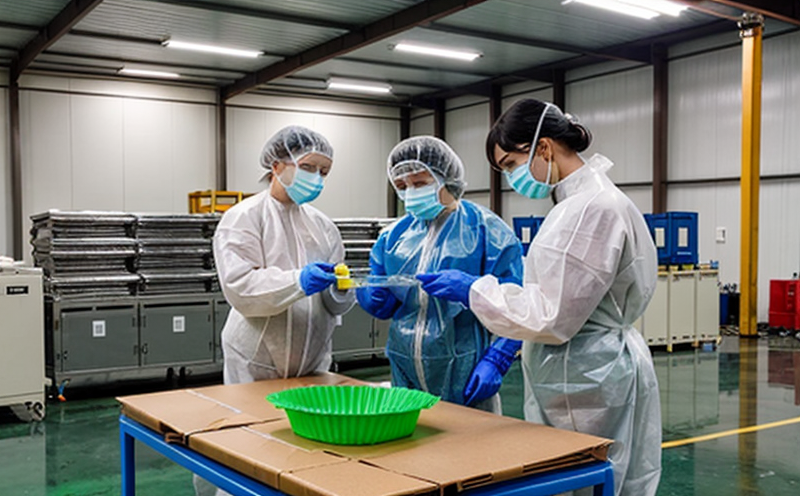ASTM F88-07 Seal Strength Measurement
The ASTM F88-07 standard provides a comprehensive method for measuring seal strength in plastic packaging. This service is particularly valuable for quality managers, compliance officers, R&D engineers, and procurement professionals who need to ensure that the seals on their products are robust and reliable.
Seal strength testing is crucial because it directly impacts product integrity and safety. A weak or improperly sealed package can lead to contamination, spoilage, or even legal issues if the product does not meet regulatory standards. ASTM F88-07 provides a standardized approach that ensures consistent results across different manufacturers and laboratories.
The test involves subjecting the seal of a sample package to a tensile load until it fails. The force at which failure occurs is measured, providing critical insights into the strength and integrity of the packaging design. This information is invaluable for product development, quality assurance, and compliance with international standards such as ISO 11607.
The ASTM F88-07 protocol specifies detailed procedures for specimen preparation, testing conditions, and data interpretation. Specimens are typically cut from the seal area of the packaging under test, ensuring that the sample accurately represents the intended seal strength. The testing apparatus used must meet stringent accuracy and precision requirements as outlined in ASTM F88.
The acceptance criteria for seal strength measurements are based on industry standards such as ISO 11607:2003. Compliance with these criteria ensures that products not only meet regulatory requirements but also perform reliably under real-world conditions. By adhering to the ASTM F88-07 standard, laboratories can provide clients with confidence in the integrity of their packaging.
ASTM F88-07 seal strength testing is particularly relevant for a wide range of plastic packaging materials including polyethylene (PE), polypropylene (PP), and various composite films. This service supports industries such as pharmaceuticals, food and beverage, and cosmetics, where product integrity and safety are paramount.
Understanding the implications of seal strength testing is essential for quality managers. By ensuring that seals meet or exceed the required standards, they can minimize risks associated with compromised packaging. Compliance officers benefit from this service by guaranteeing adherence to regulatory requirements, reducing the likelihood of non-compliance penalties. R&D engineers use ASTM F88-07 data to optimize packaging designs and improve product performance. Procurement professionals rely on this testing to ensure that suppliers deliver high-quality materials that meet seal strength specifications.
The ASTM F88-07 protocol is widely recognized for its accuracy and consistency, making it a preferred choice among laboratories worldwide. By leveraging this standard, packaging manufacturers can enhance their reputation for quality and reliability, thereby gaining a competitive edge in the market.
Benefits
- Enhanced Product Integrity: Ensure that seals are strong enough to prevent contamination or spoilage of products.
- Regulatory Compliance: Meet international standards and regulations for plastic packaging.
- Improved Quality Assurance: Detect potential issues early in the development process, leading to higher product quality.
- Increased Market Confidence: Gain trust from consumers by ensuring product safety and reliability.
- Competitive Advantage: Differentiate your products through superior packaging integrity and performance.
Quality and Reliability Assurance
ASTM F88-07 seal strength testing is a cornerstone of quality assurance for plastic packaging. By measuring the force required to break seals, this service helps identify any weaknesses in the design or manufacturing process. This information is invaluable for continuous improvement initiatives aimed at enhancing product reliability and customer satisfaction.
Quality managers can use ASTM F88-07 results to make informed decisions about production processes and material selection. By identifying areas where seals may fail, they can implement corrective actions that prevent such issues from occurring in future batches. This proactive approach not only improves product quality but also reduces the cost of rework or recalls.
Compliance officers play a crucial role in ensuring that all packaging meets regulatory standards. ASTM F88-07 provides a reliable method for validating compliance with international norms such as ISO 11607 and FDA regulations. By incorporating this testing into their quality assurance processes, they can demonstrate commitment to safety and integrity.
R&D engineers use the results from ASTM F88-07 tests to refine packaging designs and materials. These insights help them develop more robust seals that perform consistently across different environments and conditions. This iterative process ultimately leads to innovations in packaging technology that set new industry benchmarks for quality and reliability.
Competitive Advantage and Market Impact
- Differentiation: By offering ASTM F88-07 testing, laboratories can differentiate themselves from competitors who may not provide such comprehensive services.
- Client Loyalty: Providing accurate and reliable seal strength measurements fosters long-term relationships with clients seeking excellence in packaging integrity.
- Increased Market Share: Demonstrating a commitment to quality through ASTM F88-07 testing can attract new customers and expand market share.
- Innovation Leadership: Leading the industry in packaging technology by embracing standards like ASTM F88-07 positions laboratories as thought leaders and innovators.





